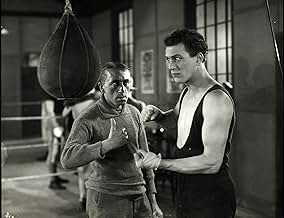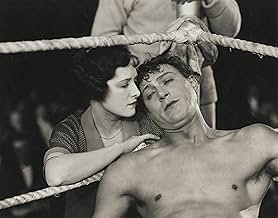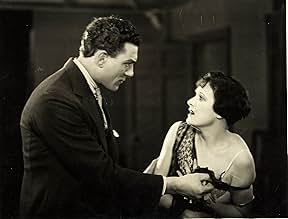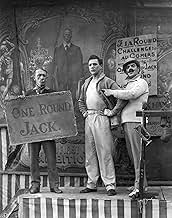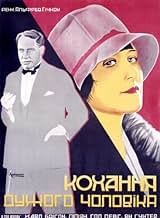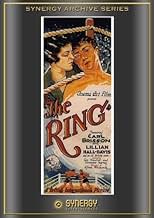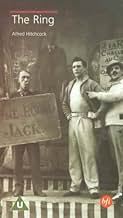VALUTAZIONE IMDb
6,1/10
4188
LA TUA VALUTAZIONE
Aggiungi una trama nella tua linguaTwo boxers compete for the love of a woman.Two boxers compete for the love of a woman.Two boxers compete for the love of a woman.
- Regia
- Sceneggiatura
- Star
Lillian Hall-Davis
- The Girl
- (as Lilian Hall Davis)
Eugene Corri
- Eugene Corri
- (non citato nei titoli originali)
Charles Farrell
- Second
- (non citato nei titoli originali)
Clare Greet
- Fortune Teller
- (non citato nei titoli originali)
Lawrence Hanray
- Clerrgyman in Black Cassock
- (non citato nei titoli originali)
Tom Helmore
- Spectator
- (non citato nei titoli originali)
Alfred Hitchcock
- Man-Dipping Attraction Worker
- (non citato nei titoli originali)
Minnie Rayner
- Boxing Contestant's Wife
- (non citato nei titoli originali)
Brandy Walker
- Spectator
- (non citato nei titoli originali)
Bombardier Billy Wells
- Boxer
- (non citato nei titoli originali)
Recensioni in evidenza
I really wanted to like this one, even watching it twice in the past week, thinking that it might grow on me (as Hitchcock's Number Seventeen has done, slightly) but it just doesn't do anything for me. Apparently, it didn't do much for the audiences in 1927 either, because from what I've been able to find out about it, despite being popular with critics, it sank at the box office.
Hitchcock not only directed but also wrote this boring melodrama, a combination of two of my least favourite genres: boxing, and romance. The world of boxing provides the backdrop for this formulaic triangle between two competitors and the girl who loves them both: but which man does she really want to marry?
The title is good, with several layered meanings in relation to the story. The fact that the film used few title cards was unique, letting visuals tell the story by themselves. There are a lot of clever visuals by Hitchcock: as we look up through the water of a pond at the two lovers; placing the ring on her finger at the marriage ceremony, only to have the bracelet slip down to her wrist, reminding her (and the audience) of the other man; girl, sitting on hubby's lap, glances across the room toward a mirror, and sees reflection of the "other man"; fingers flittering away on the ivories, distorted - but the plot, again written by Hitchcock himself, was a routine melodrama which could hardly hold my attention.
Beautiful, slightly Gothic looking church in which the ceremony occurs is an asset to the film in its few, brief scenes. Goofball comically blowing the suds off the beer, then downing it, and the film's subsequent distorted Point-Of-View shot is an amusing moment. Was this film, released October 1927, the first to use POV shots?
Hitchcock not only directed but also wrote this boring melodrama, a combination of two of my least favourite genres: boxing, and romance. The world of boxing provides the backdrop for this formulaic triangle between two competitors and the girl who loves them both: but which man does she really want to marry?
The title is good, with several layered meanings in relation to the story. The fact that the film used few title cards was unique, letting visuals tell the story by themselves. There are a lot of clever visuals by Hitchcock: as we look up through the water of a pond at the two lovers; placing the ring on her finger at the marriage ceremony, only to have the bracelet slip down to her wrist, reminding her (and the audience) of the other man; girl, sitting on hubby's lap, glances across the room toward a mirror, and sees reflection of the "other man"; fingers flittering away on the ivories, distorted - but the plot, again written by Hitchcock himself, was a routine melodrama which could hardly hold my attention.
Beautiful, slightly Gothic looking church in which the ceremony occurs is an asset to the film in its few, brief scenes. Goofball comically blowing the suds off the beer, then downing it, and the film's subsequent distorted Point-Of-View shot is an amusing moment. Was this film, released October 1927, the first to use POV shots?
"The Ring" is a surprisingly torpid little film which I thought was not one of The Master's better efforts. Yes, yes, I know, there were some of his signature cinematic compositions and visual touches, but the play's the thing, right? This was pretty ordinary subject matter for someone with Hitch's reputation - love triangle, jealousy, revenge, etc. There were no surprises, no maguffins, no suspense, just plodding drama.
Maybe the best part of this film is the casting. I enjoyed watching Carl Brisson very much as the cuckolded husband, "One-Round Jack" and the always affable Ian Hunter - even when playing a cad, although he is slightly paunchy for a heavyweight champ. Hitch also got a lot of mileage from the entertaining Gordon Harker as Jack's second.
But I disagree with some reviewers that this was one of Hitchcock's better silents. "The Manxman" is a far superior film, and also stars Brisson as a cuckolded husband. That was a story you could get your teeth into; not so with "The Ring", which was pure pablum.
Maybe the best part of this film is the casting. I enjoyed watching Carl Brisson very much as the cuckolded husband, "One-Round Jack" and the always affable Ian Hunter - even when playing a cad, although he is slightly paunchy for a heavyweight champ. Hitch also got a lot of mileage from the entertaining Gordon Harker as Jack's second.
But I disagree with some reviewers that this was one of Hitchcock's better silents. "The Manxman" is a far superior film, and also stars Brisson as a cuckolded husband. That was a story you could get your teeth into; not so with "The Ring", which was pure pablum.
Alfred Hitchcock's only screen writing credit follows the story of two aspiring boxers as they slowly work their way to the top of their game. 'One-Round' Jack (Carl Brisson) works in a carnival show, using the gimmick of being able to knock any challengers out in one round to draw the crowds. When onlooker Bob Corby is reluctantly talked into going a round with Jack, he knocks him out, much to Jack's dismay and surprise. Caught between the two fighters is Jack's girlfriend Mabel (Lilian Hall Davis) who takes a liking to Bob, especially as he begins his rise up the boxing ranks. As Jack's frustration and jealousy grows, so does his success. As the two fight their way to the top, the likelihood of a climatic bout between the two protagonists increases with every fight. Ultimately it becomes a mental and physical battle for the love of Mabel.
The meaning of the title is multi-layered - of course referring the boxing ring, but also the arm bracelet that Mabel receives from Bob that comes to represent the everlasting loop that the three lead characters are caught up in. Although relatively little-seen compared to some of the popular boxing movies, Hitchcock's silent has undoubtedly had a great impact of the sport genre, especially on Scorsese's Raging Bull. Hitchcock was fascinated with boxing - the idea of a physical and mental duel between two gladiators, and also with the dirty feel of the arena. Halls would be filled by both smartly-dressed socialites, and the working-class looking for a bit of escapism. The place would be filled with cigarette smoke, sweat and dirt trampled in by the masses. Although this doesn't quite have the cinematic flair of Scorsese's masterpiece, the photography is clearly comparable, and is extremely impressive given its era. This is Hitchcock's early experiment, where he would develop techniques he would come to perfect in his long-list of truly great films. A fascinating film from the man that would become one of the giants of cinema.
www.the-wrath-of-blog.blogspot.com
The meaning of the title is multi-layered - of course referring the boxing ring, but also the arm bracelet that Mabel receives from Bob that comes to represent the everlasting loop that the three lead characters are caught up in. Although relatively little-seen compared to some of the popular boxing movies, Hitchcock's silent has undoubtedly had a great impact of the sport genre, especially on Scorsese's Raging Bull. Hitchcock was fascinated with boxing - the idea of a physical and mental duel between two gladiators, and also with the dirty feel of the arena. Halls would be filled by both smartly-dressed socialites, and the working-class looking for a bit of escapism. The place would be filled with cigarette smoke, sweat and dirt trampled in by the masses. Although this doesn't quite have the cinematic flair of Scorsese's masterpiece, the photography is clearly comparable, and is extremely impressive given its era. This is Hitchcock's early experiment, where he would develop techniques he would come to perfect in his long-list of truly great films. A fascinating film from the man that would become one of the giants of cinema.
www.the-wrath-of-blog.blogspot.com
"The Ring" is, for me, Hitchcock's best silent feature. It is a nippy little romance which sprints along with a surprisingly swift pace.
There's the typical early Hitch experimentation - the camera getting "knocked out" in a boxing scene is a prime example and some fine comedic moments in what is otherwise a pretty serious story of love and betrayal although, with the boxing backdrop, the rather mundane story is slightly more exciting.
Less gimicky than the more famous "The Lodger", and therefore more believable, "The Ring" is an underrated, early effort from the man who went on to become one of the most celebrated directors in the world.
NB. Catch hold of the BFI release of this video if you can - the score is superb and by far the best new music I have heard composed for a silent movie.
There's the typical early Hitch experimentation - the camera getting "knocked out" in a boxing scene is a prime example and some fine comedic moments in what is otherwise a pretty serious story of love and betrayal although, with the boxing backdrop, the rather mundane story is slightly more exciting.
Less gimicky than the more famous "The Lodger", and therefore more believable, "The Ring" is an underrated, early effort from the man who went on to become one of the most celebrated directors in the world.
NB. Catch hold of the BFI release of this video if you can - the score is superb and by far the best new music I have heard composed for a silent movie.
The Ring was made from the only screenplay Hitchcock wrote himself and it deals, as many of his earliest pictures do, with a love triangle. At first glance, it looks like a more cynical update of the infidelity-themed morality comedies of Cecil B. De Mille, but more than that it is the first really competent Hitchcock picture. Even if he was not yet using the ideas and motifs of suspenseful thrillers, he was at least developing the tools with which to create suspense.
As well as being a student of the German Expressionist style, the rhythmic editing style of Sergei Eisenstein had had its impact upon Hitchcock. But here he keeps tempo not just with the edits but with the content of the imagery. This is apparent from the opening shots, where spinning fairground rides brilliantly establish a smooth tempo. And like Eisenstein, the editing style seems to suggest sound for example when a split-second shot of the bell being rung is flashed in, we almost subconsciously hear the sound because the image is so jarring.
There is also a contrast, particularly with silent films from the US, in that The Ring is not cluttered up with too many title cards. As much as possible is conveyed by imagery, and Hitch has enough faith in the audience to either lip-read or at least infer the meaning of the bulk of the characters' speech. And it's not done by contrived symbolism or overacting, it's all done by getting the right angles and the right timing, particularly with point-of-view shots, as well as some strong yet subtle performances. There are unfortunately a few too many obvious expressionist devices (particularly double exposures), many of which were unnecessary, but there is far less of this than there is in The Lodger.
Let's make a few honourable mentions for the aforementioned actors. First up, the stunningly handsome and very talented Carl Brisson in the lead role. In spite of his talent I was at first a bit confused as to why he got the role, as to be honest he looks more like a ballet dancer than a pugilist! But that just goes to show how much I know, as it turns out Brisson was in fact a former professional boxer and inexperienced in acting. Playing his rival is the competent Ian Hunter, who would go on to have a lengthy career in supporting roles right up to the 60s. The most demanding role in The Ring has to be that given to Lillian Hall-Davis, torn between two lovers. She pulls it off very well however with an emotive, understated performance, and it's a shame her career never lasted in the sound era. And last but not least the great Gordon Harker provides some comic relief in what is probably his best ever role.
The Ring's climactic fight scene is among the most impressive moments of silent-era Hitchcock. Martin Scorcese may have had his eye on The Ring when he directed the fight scenes in Raging Bull, as his watchword for these scenes was "Stay inside the ring". The fight in The Ring starts off with some fairly regular long shots, but when the action intensifies Hitchcock drops us right in the middle of it, with close-ups and point-of-view shots. Hitchcock's aim always seems to have been to involve his audience, and this was crucial in his later career where the secret of his success was often in immersing the viewer in the character's fear or paranoia.
The Ring really deserves more recognition than the inferior but better known The Lodger. It's a much more polished and professional work than the earlier picture, and probably the best of all his silent features.
As well as being a student of the German Expressionist style, the rhythmic editing style of Sergei Eisenstein had had its impact upon Hitchcock. But here he keeps tempo not just with the edits but with the content of the imagery. This is apparent from the opening shots, where spinning fairground rides brilliantly establish a smooth tempo. And like Eisenstein, the editing style seems to suggest sound for example when a split-second shot of the bell being rung is flashed in, we almost subconsciously hear the sound because the image is so jarring.
There is also a contrast, particularly with silent films from the US, in that The Ring is not cluttered up with too many title cards. As much as possible is conveyed by imagery, and Hitch has enough faith in the audience to either lip-read or at least infer the meaning of the bulk of the characters' speech. And it's not done by contrived symbolism or overacting, it's all done by getting the right angles and the right timing, particularly with point-of-view shots, as well as some strong yet subtle performances. There are unfortunately a few too many obvious expressionist devices (particularly double exposures), many of which were unnecessary, but there is far less of this than there is in The Lodger.
Let's make a few honourable mentions for the aforementioned actors. First up, the stunningly handsome and very talented Carl Brisson in the lead role. In spite of his talent I was at first a bit confused as to why he got the role, as to be honest he looks more like a ballet dancer than a pugilist! But that just goes to show how much I know, as it turns out Brisson was in fact a former professional boxer and inexperienced in acting. Playing his rival is the competent Ian Hunter, who would go on to have a lengthy career in supporting roles right up to the 60s. The most demanding role in The Ring has to be that given to Lillian Hall-Davis, torn between two lovers. She pulls it off very well however with an emotive, understated performance, and it's a shame her career never lasted in the sound era. And last but not least the great Gordon Harker provides some comic relief in what is probably his best ever role.
The Ring's climactic fight scene is among the most impressive moments of silent-era Hitchcock. Martin Scorcese may have had his eye on The Ring when he directed the fight scenes in Raging Bull, as his watchword for these scenes was "Stay inside the ring". The fight in The Ring starts off with some fairly regular long shots, but when the action intensifies Hitchcock drops us right in the middle of it, with close-ups and point-of-view shots. Hitchcock's aim always seems to have been to involve his audience, and this was crucial in his later career where the secret of his success was often in immersing the viewer in the character's fear or paranoia.
The Ring really deserves more recognition than the inferior but better known The Lodger. It's a much more polished and professional work than the earlier picture, and probably the best of all his silent features.
Lo sapevi?
- QuizAccording to the dialogue card at 1:19:06, the big fight between Jack Saunders and Bob Corby was refereed by Eugene Corri, who entered the ring wearing a tux. Corri made boxing history in December 1907 by being the first referee to referee inside the ring during a fight.
- BlooperDuring the first boxing scene, when the assistant is helping the sailor put on his coat, the coat is on nearly all the way; then, in the next shot, it is shown being put back on again.
- Citazioni
The Promoter: If you win this next fight with the nigger, you'll be in the running for the championship.
- ConnessioniFeatured in Silent Britain (2006)
I più visti
Accedi per valutare e creare un elenco di titoli salvati per ottenere consigli personalizzati
- How long is The Ring?Powered by Alexa
Dettagli
- Data di uscita
- Paese di origine
- Lingua
- Celebre anche come
- The Ring
- Luoghi delle riprese
- Azienda produttrice
- Vedi altri crediti dell’azienda su IMDbPro
- Tempo di esecuzione
- 1h 56min(116 min)
- Mix di suoni
- Proporzioni
- 1.33 : 1
Contribuisci a questa pagina
Suggerisci una modifica o aggiungi i contenuti mancanti

